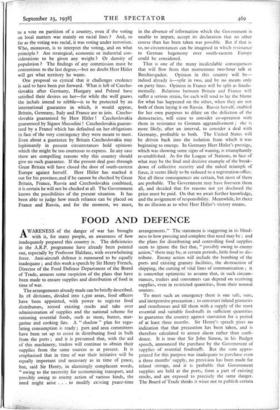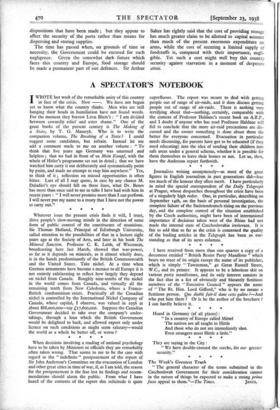FOOD AND DEFENCE
AWARENESS of the danger of war has brought with it, for many people, an awareness of how inadequately prepared this country is. The deficiencies in the A.R.P. programme have already been pointed out, especially by Professor Haldane, with overwhelming force. Anti-aircraft defence is rumoured to be equally inadequate ; and this week a speech by Sir Henry French, Director of the Food Defence Department of the Board of Trade, arouses some suspicion of the plans that have been made to ensure supplies and distribution of food in time of war.
The arrangements already made can be briefly described. In 18 divisions, divided into 1,500 areas, food officers have been appointed, with power to regis ter food distributors, record existing stocks and take over administration of supplies and the national scheme for rationing essential foods, such as meat, butter, mar- garine and cooking fats. A " shadow " plan for regu- lating consumption is ready ; port and area committees have been set up to assist in distributing food in bulk from the ports ; and it is presumed that, with the aid of this machinery, traders will continue to obtain their supplies from the same sources as at present. It is emphasised that in time of war their initiative will be equally important and necessary as in time of peace, but, said Sir Henry, in alarmingly complacent words, " owing to the necessity for economising transport, and possibly owing to enemy action of various kinds, the need might arise . . . to modify existing peace-time arrangements." The statement is staggering in its blind- ness to how pressing and complete that need may be ; and the plans for distributing and controlling food supplies seem to ignore the fact that, " possibly owing to enemy action," there may be, at certain periods, little food to dis- tribute. Enemy action will include the bombing of the ports and existing granary facilities, the destruction of shipping, the cutting of vital lines of communication ; it is somewhat optimistic to assume that, in such circum- stances, traders and consumers can depend on receiving supplies, even in restricted quantities, from their normal sources.
To meet such an emergency there is one safe, sure, and inexpensive precaution ; to construct inland granaries and storehouses and fill them with a supply of the most essential and suitable foodstuffs in sufficient quantities to guarantee the country against starvation for a period. of at least three months. Sir Henry's speech gives no indication that that precaution has been taken, and is therefore calculated to arouse alarm rather than confi- dence. It is true that Sir John Simon, in his Budget speech, announced the purchase by the Government of supplies of essential foodstuffs. But the sum appro- priated for this purpose was inadequate to purchase even a three months' supply, no provision has been made for inland storage, and it is probable that Government supplies are held at the ports, form a part of existing stocks, and are exposed to precisely the same danger. The Board of Trade thinks it wiser not to publish certain dispositions that have been made ; but they appear to affect the security of the ports rather than means for dispersing and storing supplies.
The time has passed when, on grounds of time or necessity, the Government could be excused for such negligence. Given the somewhat dark future which faces this country and Europe, food storage should be made a permanent part of our defences. Sir Arthur Salter has rightly said that the cost of providing storage has much greater claim to be allotted to capital account than much of the present enormous expenditure on arms, while the cost of securing a limited supply of foodstuffs is, compared with their importance, negli- gible. Yet such a cost might well buy this country security against starvation in a moment of desperate crisis.







































 Previous page
Previous page